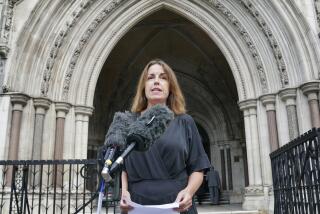British government defends raid that freed reporter in Afghanistan
reporting from london
Accused of acting hastily, the British government Thursday defended its decision to mount a raid in Afghanistan that freed a kidnapped New York Times reporter but left dead his Afghan assistant, a British commando and, possibly, Afghan civilians.
The operation in northern Afghanistan, carried out early Wednesday, was authorized by the British defense and foreign secretaries, who had kept close tabs on the effort to locate journalist Stephen Farrell and his interpreter, Sultan Munadi. Farrell, a British-Irish national, and Munadi were kidnapped last week by the Taliban in Kunduz province.
British officials said the “difficult decision” to send in commandos was taken only “after extensive consideration and planning.”
“Given the considerable risk to Stephen’s and Sultan’s lives, the operation represented our best chance of protecting their lives,” said a spokesman for the British Foreign Office, speaking on customary condition of anonymity.
But some critics are questioning whether the two men’s freedom might not have been won in a less costly fashion through negotiations, including the possible payment of a ransom.
Others accuse Farrell of acting recklessly and endangering not just himself but his colleague by going into an area known to be perilous. The two men were abducted Saturday while reporting on the deadly NATO airstrike a day earlier in Kunduz that blew up two hijacked fuel tankers and killed scores of people, at least some of them civilians.
Before dawn Wednesday, British commandos and Afghan troops made their assault on the house where Farrell and Munadi were being held. Farrell has said the pandemonium that ensued made it virtually impossible to distinguish friend from foe.
After he and Munadi crept outside, the interpreter took the lead, holding up his arms and shouting, “Journalist! Journalist!” but then crumpling to the ground in a hail of gunfire. Farrell managed to escape harm and turned himself over to British troops.
The raid was reportedly judged necessary because of fears that the Taliban might move their hostages over the border into Pakistan.
But the Times of London on Thursday quoted unnamed sources in Kabul, the Afghan capital, as saying that “there was no immediate urgency” that the men would be harmed or moved, and that the kidnappers mostly wanted ransom.
After the raid, Prime Minister Gordon Brown said that Britain “does not make substantive concessions, including paying ransoms,” to kidnappers. “Whenever British nationals are kidnapped, we and our allies will do everything in our power to free them,” he said.
The raid and the death of a British commando will probably add to the Afghanistan conflict’s deepening unpopularity in Britain, which aside from the U.S. has committed the most troops, about 9,000, to the war. A poll released Thursday showed that slightly more than half of Britons think their nation’s troops should never have been sent to Afghanistan.
In Afghanistan, local journalists mourned the loss of their colleague, paying their respects to Munadi’s grief-stricken family and laying flowers on his grave in Kabul.
A group called the Media Club of Afghanistan condemned the Taliban for abducting journalists, but also directed anger at Western forces, whom it accused of a double standard in their treatment of foreigners and Afghans.
The organization “holds the international forces responsible for the death of Mr. Munadi because they resorted [to] military action before exhausting other nonviolent means,” a statement from the group said. “There is no justification for the international forces to rescue their own national, and retrieve the dead body of their own soldier killed in action, but leave behind the dead body of Sultan Munadi in the area. The Media Club of Afghanistan deems this action as inhumane.”
--
Special correspondent M. Karim Faiez in Kabul contributed to this report.
More to Read
Sign up for Essential California
The most important California stories and recommendations in your inbox every morning.
You may occasionally receive promotional content from the Los Angeles Times.










